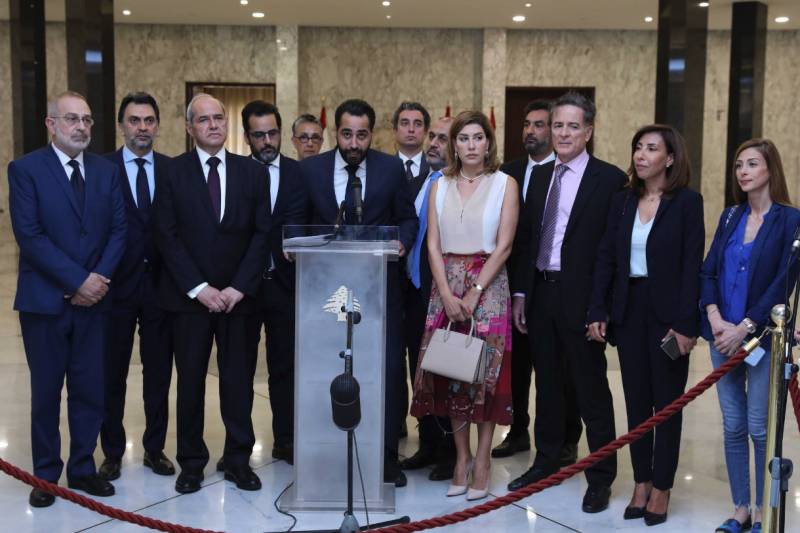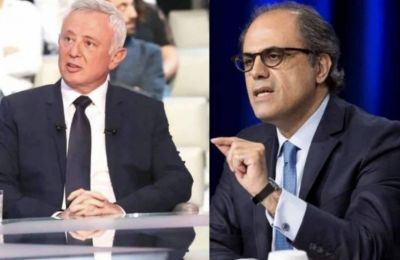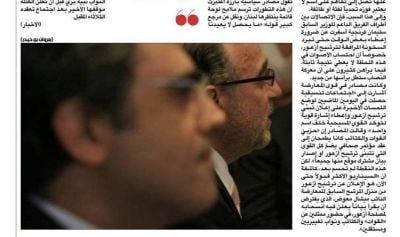
The 13 MPS for change pose in Baabda, 23 June 2022. (Credit: Dalati and Nohra/archive)
While the two main Christian parties [the Free Patriotic Movement (FPM) and the Lebanese Forces (LF)], MP Michel Moawad’s Renewal bloc, as well as some independents have decided in favor of Jihad Azour’s candidacy, opposition MPs are moving forward in scattered ranks.
Mark Daou and Waddah Sadek have announced their support for the former finance minister. Najate Saliba is also expected to give him her vote. For their part, Cynthia Zarazir and Halimé Kaakour have already announced their refusal to endorse Azour’s candidacy.
Ibrahim Mneimneh, for his part, said Tuesday that he would not support “any candidate until we agree with him on his political vision.”
While some Forces of Change MPs remain hesitant in their endorsement of Azour, others have made their stance clear.
“It’s not our place to explain why we won’t be casting our vote in favor of Azour. Instead, it is up to others to justify their support for him,” Kaakour told L’Orient-Le Jour. She asserted that Azour’s election is highly unlikely, predicting that the June 14 session too will be marked by a contentious struggle and result in failure.
“We are not here to engage in political maneuvering. We witnessed a similar situation with Michel Moawad, where the opposition utilized his candidacy as a political tool,” Kaakour said. “Now we see the same scenario playing out with Azour.”
Kaakour points out that the various factions within the Christian parties, which collectively represent approximately 30 votes in support of Azour, lack a shared vision and possess few political similarities.
Their primary objective, she claimed, is simply to eliminate Frangieh from the equation.
“They have come together to counter the candidate from the opposing camp. That’s the extent of it,” Kaakour said.
‘No divisive candidate’
There are several reasons why Azour’s candidacy is not receiving unanimous support among protest movement MPs.
One of the primary concerns expressed by some is the belief that Azour’s background as an IMF official contributes to division and polarization within the country, particularly in light of recent communal tensions that have emerged.
Like the reaction provoked by Frangieh’s candidacy, the leader of the Marada party who received fierce support from Amal and Hezbollah despite the opposition of nearly all Christian parties, Azour’s candidacy is also perceived through the lens of discord and disagreement.
Despite the efforts of Azour’s backers to portray him as a non-confrontational centrist candidate, many remain unconvinced.
According to Elias Jarade, the opposition [of some Forces of Change MPs] to Azour’s candidacy stems from the need for a president who can unite the country and restore the Lebanese people’s confidence, rather than a candidate who may provoke further division. The priority is to elect a president who can bridge the gaps and foster unity.
Expressing this stance more explicitly, MP Yassin Yassin emphasized that the nomination of Azour was a misstep.
“The purpose should be to elect a president, not to exacerbate divisions within the nation,” Yassin told L’Orient-Le Jour.
The divisive nature of the candidates has led Oussama Saad and Abdul Rahman Bizri, MPs from Saida known for their proximity to the protest movement, to align themselves with the “neither Azour nor Frangieh” camp.
“The two candidates were not nominated on the basis of national criteria,” Saad told L’Orient-Le Jour. “Their candidacy is the result of outside interference and the exacerbation of communal division.”
Proximity to Siniora
The Change Bloc MPs also criticize Azour’s political background, arguing that it aligns him with the “political establishment” that the protest movement forces aim to remove from the political arena. They point out that Azour previously served as finance minister under former Prime Minister Fouad Siniora from 2005 to 2008 and worked as his advisor for several years.
While few are willing to directly accuse Azour of corruption, there are those who express their doubts. In the 2013 book “Le quitus impossible,” MP Ibrahim Kanaan (FPM) accused Siniora of manipulating accounts and misappropriating public funds. Siniora, in response, published his own book accusing Kanaan of slander.
Hezbollah raised the issue of corruption allegations in its power struggle with the Siniora. The matter was not pursued further, however, and was effectively swept under the rug by FPM. After Michel Aoun’s election as president in 2016, the party reached a compromise with the Hezbollah camp, effectively burying the accusations.
Some former politicians downplay the corruption allegations against Azour, arguing that they lack seriousness.
“When suspicions of corruption rise,” Kaakour said, “it would be prudent to exercise caution.”
While suspicions of corruption may exist, they are not first among the reasons certain bloc members cite for refusing to support Azour. Their primary concern is the election of a president who can unify the country and help calm the internal situation.
According to Jarade, corruption issues are not his main priority. He believes that this is not the appropriate time to raise such matters, especially since accusations of embezzlement extend to both sides of the political spectrum. Instead, the focus should be on selecting a president who can bring unity and stability to Lebanon.
‘Nobody consulted us’
Another deterrent that is likely to push the Change MPs toward neutrality — or a third choice — is the way in which the Christian parties have ignored their colleagues in their endorsement of Azour.
“Nobody consulted us,” Yassin said, recalling that his bloc had done the opposite, sponsoring an initiative with a list of centrist figures likely to be accepted by both sides (Salah Honein, Ziyad Baroud and Nassif Hitti) and submitting it to the main political parties during a tour with the opposition parties.
It is said things took a turn for the worse when Azour, who made an appointment with the Change MPs last Wednesday, canceled the meeting at the last minute, citing “personal reasons.”
Azour said he’d canceled because his position at the IMF did not allow him to campaign at this stage. Change MPs were skeptical of this explanation, since Azour had previously met with Hezbollah and Parliament Speaker Nabih Berri, as well as certain figures from the Christian parties.
“We know nothing about him, his vision, or his program,” Yassin said.
Caught between the imperative of seizing a valuable voting opportunity to avoid accusations of passivity or idealism, and the commitment to uphold their principles, especially among their constituents, protest movement-affiliated MPs find themselves confronting a significant test of their popularity. They are well aware that their stance in the upcoming session will undergo careful scrutiny.
“Faced with a choice between unfavorable options, we would settle for the lesser of two evils,” Yassin said.
“We are not idealistic, but realistic in our approach,” he added. “We want a president who can ascend to Baabda. Is it we who lack pragmatism or is it the others?”
This story first ran in French in, L’Orient-Le Jour, translated by Sahar Ghoussoub.

